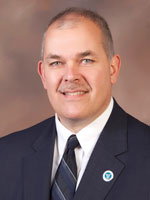
If elected, what would be your focus as president-elect and eventually, president?
My focus as president-elect and president will be to maximize member benefits and services and positively impact member relations to eliminate the disconnect that exists between the State Bar and its members. This can be accomplished through member-to-member contact, and through increased communications, as discussed below.
I have been working on these matters, and through leadership, I have the support of members and the State Bar administration and staff. My work has been positive and productive. Unlike a policy-orientated focus, which might be subject to factors beyond our control, we are able to move forward on member-to-member contact, and communications, regardless of the circumstances.
What do you think is the most pressing issue facing the legal profession?
The most pressing issue facing the legal profession is managing current economic factors and consequences. At every turn, the profession as a whole is facing economic pressure. The unauthorized practice of law directs potential earnings to non-lawyers. Technological advances add economic pressure both in-office and through non-lawyer competition. Political forces will seek to restrict recoveries, and perhaps tax legal services. Inadequate resources for the payment of fees to assure representation for indigent litigants will further reduce the availability of quality representation. Funding cuts may further stress the court system and reduce opportunities for government lawyers. Hiring practices in a slow economy will reduce positions available for new attorneys, forcing many to attempt to begin solo practices without experience, and resulting in many not being able to service loan debt. Even established attorneys will modify their practices based on economic slowdown.
The State Bar cannot flip a switch and eliminate these economic concerns. But more than ever, the State Bar must be attuned to the needs of members, must address the needs promptly and efficiently, and must fashion appropriate solutions and policies. To avoid issues by promoting State Bar “status quo” is simply unacceptable.
When you talk to members of the State Bar of Wisconsin, what are their biggest concerns, and how should the State Bar address them?
By far, members’ biggest concerns have to do with the State Bar’s lack of relevancy for the member. The concerns are expressed in different ways: “What does the Bar do for me?” “Why do we need the Bar at all?” “The Bar is not relevant for me.”
These questions or comments, repeated over and over, confirm the disconnect mentioned above. Having served on the Member Benefits, Member Relations, Member Benefits Advisory, and now Insurance and Member Benefits Committees (currently co-chair), I identified what I called a disconnect. The State Bar did provide services and benefits, but did so from an “inside-out” perspective. Members were not aware of or did not understand State Bar services and benefits; or those services and benefits were not well received.
The State Bar was also not receiving valuable input or feedback from members. There were obvious questions: “What good are services or benefits if they are unknown or unused?” and “How can the Bar address members’ perception of Bar irrelevance?”
A few things to note: 1) I have been instrumental in creating the current member benefits and services focus. My approach is innovative, positive, and productive. My leadership in this area is unmatched; 2) the approach and structure now in place are not at odds with the State Bar. In fact, the current focus is embraced by the Bar and its staff. We are moving forward with something the Bar now recognizes is absolutely necessary and critical to the success of the Bar into the future. Any suggestion that the State Bar could continue to operate “inside-out” without member input and feedback is neither realistic nor beneficial; 3) the current structure allows our committee members and ad hoc members the opportunity for member-to-member contact through local and specialty bars, resulting in an increased understanding of benefits and services for members, and resulting in constructive feedback for the State Bar. These efforts reduce disconnect and increase Bar relevancy. The Bar exists for its members, and through appropriate leadership, the Bar can maximize benefits and services and can improve member relations.
The State Bar cannot ignore the opinions of members. To the contrary, the Bar should receive information and feedback through the structure I have helped create. By acting on concerns, and with appropriate information, the Bar will benefit by being vibrant and strong; member participation will increase; and member dissatisfaction will be reduced. We will continue to promote increased communication among all components of the State Bar, and through local and specialty bars. These communications will maximize State Bar efficiency, ease transitions into the future, and promote the commonality we have as attorneys. You will be part of an organization that recognizes your input, and strives to make you want to be a member.
Related:
